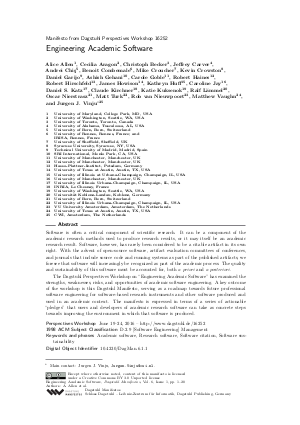Engineering Academic Software (Dagstuhl Perspectives Workshop 16252)
Authors Alice Allen, Cecilia Aragon, Christoph Becker, Jeffrey Carver, Andrei Chis, Benoit Combemale, Mike Croucher, Kevin Crowston, Daniel Garijo, Ashish Gehani, Carole Goble, Robert Haines, Robert Hirschfeld, James Howison, Kathryn Huff, Caroline Jay, Daniel S. Katz, Claude Kirchner, Katie Kuksenok, Ralf Lämmel, Oscar Nierstrasz, Matt Turk, Rob van Nieuwpoort, Matthew Vaughn, Jurgen J. Vinju
-
Part of:
Issue:
Dagstuhl Manifestos, Volume 6, Issue 1
Part of: Volume: Dagstuhl Manifestos, Volume 6
Part of: Journal: Dagstuhl Manifestos (DagMan) - License:
 Creative Commons Attribution 3.0 Unported license
Creative Commons Attribution 3.0 Unported license
- Publication Date: 2017-05-23
File

PDF
DagMan.6.1.1.pdf
- Filesize: 0.94 MB
- 20 pages
Document Identifiers
Subject Classification
Keywords
- Academic software
- Research software
- Software citation
- Software sustainability
Metrics
- Access Statistics
-
Total Accesses (updated on a weekly basis)
0PDF Downloads0Metadata Views
Abstract
Software is often a critical component of scientific research. It can be a component of the academic research methods used to produce research results, or it may itself be an academic research result. Software, however, has rarely been considered to be a citable artifact in its own right. With the advent of open-source software, artifact evaluation committees of conferences, and journals that include source code and running systems as part of the published artifacts, we foresee that software will increasingly be recognized as part of the academic process. The quality and sustainability of this software must be accounted for, both a prioro and a posteriori. The Dagstuhl Perspectives Workshop on "Engineering Academic Software" has examined the strengths, weaknesses, risks, and opportunities of academic software engineering. A key outcome of the workshop is this Dagstuhl Manifesto, serving as a roadmap towards future professional software engineering for software-based research instruments and other software produced and used in an academic context. The manifesto is expressed in terms of a series of actionable "pledges" that users and developers of academic research software can take as concrete steps towards improving the environment in which that software is produced.
Cite As Get BibTex
Alice Allen, Cecilia Aragon, Christoph Becker, Jeffrey Carver, Andrei Chis, Benoit Combemale, Mike Croucher, Kevin Crowston, Daniel Garijo, Ashish Gehani, Carole Goble, Robert Haines, Robert Hirschfeld, James Howison, Kathryn Huff, Caroline Jay, Daniel S. Katz, Claude Kirchner, Katie Kuksenok, Ralf Lämmel, Oscar Nierstrasz, Matt Turk, Rob van Nieuwpoort, Matthew Vaughn, and Jurgen J. Vinju. Engineering Academic Software (Dagstuhl Perspectives Workshop 16252). In Dagstuhl Manifestos, Volume 6, Issue 1, pp. 1-20, Schloss Dagstuhl – Leibniz-Zentrum für Informatik (2017)
https://doi.org/10.4230/DagMan.6.1.1
BibTex
@Article{allen_et_al:DagMan.6.1.1,
author = {Allen, Alice and Aragon, Cecilia and Becker, Christoph and Carver, Jeffrey and Chis, Andrei and Combemale, Benoit and Croucher, Mike and Crowston, Kevin and Garijo, Daniel and Gehani, Ashish and Goble, Carole and Haines, Robert and Hirschfeld, Robert and Howison, James and Huff, Kathryn and Jay, Caroline and Katz, Daniel S. and Kirchner, Claude and Kuksenok, Katie and L\"{a}mmel, Ralf and Nierstrasz, Oscar and Turk, Matt and van Nieuwpoort, Rob and Vaughn, Matthew and Vinju, Jurgen J.},
title = {{Engineering Academic Software (Dagstuhl Perspectives Workshop 16252)}},
pages = {1--20},
journal = {Dagstuhl Manifestos},
ISSN = {2193-2433},
year = {2017},
volume = {6},
number = {1},
editor = {Allen, Alice and Aragon, Cecilia and Becker, Christoph and Carver, Jeffrey and Chis, Andrei and Combemale, Benoit and Croucher, Mike and Crowston, Kevin and Garijo, Daniel and Gehani, Ashish and Goble, Carole and Haines, Robert and Hirschfeld, Robert and Howison, James and Huff, Kathryn and Jay, Caroline and Katz, Daniel S. and Kirchner, Claude and Kuksenok, Katie and L\"{a}mmel, Ralf and Nierstrasz, Oscar and Turk, Matt and van Nieuwpoort, Rob and Vaughn, Matthew and Vinju, Jurgen J.},
publisher = {Schloss Dagstuhl -- Leibniz-Zentrum f{\"u}r Informatik},
address = {Dagstuhl, Germany},
URL = {https://drops.dagstuhl.de/entities/document/10.4230/DagMan.6.1.1},
URN = {urn:nbn:de:0030-drops-71468},
doi = {10.4230/DagMan.6.1.1},
annote = {Keywords: Academic software, Research software, Software citation, Software sustainability}
}
